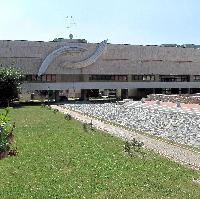The Mircea Carp Collection includes original documents and copies gathered by its creator during his activity as a journalist for the radio stations Voice of America and RFE in the period 1955–1995. This collection is one of the largest collections related to the activity of the Romanian emigration. It illustrates the instrumental role that these two radio agencies played in the case of communist Romania as alternative sources of information and transmission belts between critical intellectuals and society.
-
Vieta:
-
Cluj-Napoca Strada Clinicilor 2, Romania 400000
-
Temos:
-
Įkūrimo data:
-
Charakteringi eksponatai:
The Miroslav Brandt Papers are deposited at the Collection of Old books and Manuscripts at the National and University Library in Zagreb. It reveals cultural-oppositional activities of Croatian historian Miroslav Brandt, who became one of the consistent critics of Yugoslav regime and its ideology after ending his membership in the League of Communists of Croatia and participating in the Croatian Spring (1967-1971).
-
Vieta:
-
Zagreb Hrvatske Bratske Zajednice 4, Croatia 10000
-
Temos:
-
Įkūrimo data:
-
Charakteringi eksponatai:
Miodrag Mica Popovic (1923-1996) was a painter, art critic, writer and academician. Popovic's lifestyle itself can be described as in cultural opposition to the regime and government that imposed its own ideological forms. Until the end of his life, he clearly demonstrated his incompatibility with the system, which let him stay faithful to the ideal of free thinking and expression. The images from the series the ‘Scenes Painting’ [Slikarstvo prizora] stem from the period between 1968 to 1971. Through that series the artist critized the social and political circumstances in socialist Yugoslavia.
-
Vieta:
-
Temos:
-
Įkūrimo data:
-
Charakteringi eksponatai:
The modern collection of the Gallery of Szombathely eloquently exemplifies the complex relationship between official culture and the culture of dissent during the socialist period. The genealogy of the collection is inseparable from the conservation of the leftist counter-culture of the Horthy era, especially of the legacy of the left-wing painter Gyula Derkovits, who was born in Szombathely. The collection of artworks was based on the notion of “progress,” and it became increasingly intense in the 1970s, but it only partly followed the socialist canon. It also initiated the emergence of new and critical trends that were in opposition to the official culture politics.
-
Vieta:
-
Szombathely Rákóczi Ferenc utca 12, Hungary 9700
-
Temos:
-
Įkūrimo data:
-
Charakteringi eksponatai:
Ádám Modor’s bequest offers insights into a chapter of samizdat publishing in the 1980s: the history of the Katalizátor Iroda. The collection presents the various stages in the history of the publisher and represents samizdat publishing as a (counter-)cultural act, as well as a document of the trajectories of a samizdat publisher.
-
Vieta:
-
Budapest Pinty utca 22, Hungary 1121
-
Temos:
-
Įkūrimo data:
-
Charakteringi eksponatai:





